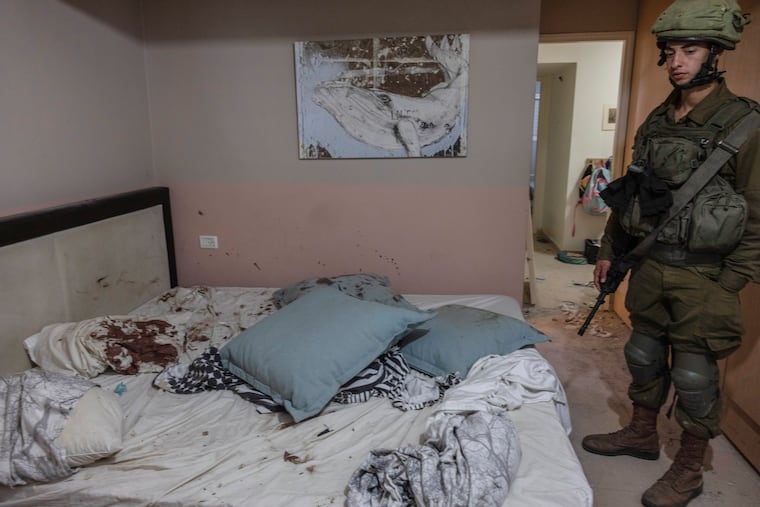Bombs won’t stop these Philadelphia women from heading to Israel to let victims of sexual violence know they are not alone
“We must speak out and use our own voices for those who are no longer here.”

Marcy Gringlas is a woman of gentleness, resolve, and unwavering courage.
She spent Saturday night in Tel Aviv, packing bags with water and flashlights for her bomb shelter as 300 Iranian missiles and drones headed toward Israel. The Philadelphia-based cofounder of the Seed the Dream Foundation was hoping to greet a contingency of 25 American women who were set to arrive on Sunday, but have now been delayed.
These volunteers were traveling to Israel to amplify the voices of the hostages and the survivors of Hamas’ Oct. 7 massacre — especially those who experienced sexual violence at the terrorists’ hands.
The women tell me not Iranian missiles — nor the promise by Hamas to repeat the Oct. 7 slaughter of around 1,200 people “time and again until Israel is annihilated” — is going to keep them from getting to Israel as soon as possible.
“The #IBelieveIsraeliWomen movement is already underway,” Seed the Dream’s executive director Talia Kaplan, also of Philadelphia, told me. “And we are working with our partners now to launch this unstoppable network for action.”
The trip to Israel is the beginning of what Gringlas hopes will become a worldwide movement. As a daughter of Holocaust survivors, Gringlas told me she never thought she would live to see the largest slaughter of Jews since the Holocaust, and the continued denialism of all that the victims suffered.
At the Tel Aviv Sexual Assault Crisis Center, a Seed the Dream grantee, many women “felt that in their minds, they were all alone and that the world had completely turned on them,” Gringlas said.
It was hard for most of us to know what to do, but not for Gringlas. She joined forces with Jewish Women International to organize women across the country to join them in Israel, a key step to building a worldwide movement.
The executive editor of Hadassah Magazine, Philadelphia-based Lisa Hostein, was also supposed to be in Israel this week. “Now, more than ever, we need to remember the threats to Israelis are never ending,” she told me. “We must do everything in our power to end the silence surrounding the sexual violence that Israeli women have suffered.”
The goal is to allow Israeli victims to be heard, and demand that international courts hold Hamas responsible.
Accountability for Hamas has been slow in coming. In late 2023, the New York Times first told the story of what happened to Israeli victims on Oct. 7. The Times spoke to several first responders who described “finding more than 30 bodies of women and girls … legs spread, clothes torn off, signs of abuse in their genital areas.”
The United Nations sent its special envoy for sexual violence in conflict, Pramila Patten, and her team to investigate at the end of January, almost four months after the attack. What they found was evidence that there was “sexual violence, including genital mutilation, sexualized torture, or cruel, inhuman and degrading treatment” at various locations during the Oct. 7 attack.
The U.N. team reported they also found “clear and convincing information” that some of the hostages taken by Hamas have been “subjected to various forms of conflict-related sexual violence and has reasonable grounds to believe that such violence may be ongoing.”
Since then, there’s been a relentless torrent of what Gringlas calls “denialism” aimed at discrediting Israeli victims, especially victims of sexual assault. Of course, many of the victims mentioned in the report are dead. They no longer have a voice.
» READ MORE: Sexual violence in war is a crime — no matter who perpetuates it | Jonathan Zimmerman
Of those who survived — including, according to the New York Times, one man — it may take years to find a way to tell their stories.
As the child of two Holocaust survivors, Edna Schwab knows this well. The Philadelphia-based physician remains motivated to head to Israel after watching her 98-year-old mother relive the tortures of the Holocaust on Oct. 7.
“We have to recognize that for most of the Oct. 7 victims that survive, the pain and horror will never end,” she told me. “My father would always ask, ‘Why do they always hate the Jews?’”
That hatred and the denialism of both the Holocaust and Oct. 7 is unacceptable. “Survivors of the Holocaust like my parents bore witness and gave firsthand testimony,” she said.
But survivor voices from Oct. 7 are just starting to be heard.
“We must be their voice now,” Gringlas added, as she and her Seed the Dream staff prepared to get their coalition to Israel. “We must speak out and use our own voices for those who are no longer here.”